Le Samouraï: Purpose in the Void
Silent Codes and Self-Possession
In Le Samouraï, we encounter a Paris of muted whispers—a grayscale trompe l’oeil, slick with rain, drained of color though resonant in its ambient quiet. The city, bathed in somber blues and weary grays, reflects a realm seemingly devoid of any moral foundation.
Here, neither right nor wrong stand on stable ground. Yet amid these monochrome streets emerges Jef Costello, a lone figure whose internal sense of order becomes the only anchor in a drifting universe.
A Monastic Existence
Jef’s apartment resembles a monastic cell more than a home. The worn walls and bare furnishings evoke a simple temple where time itself seems to slow. His meticulous morning rituals: a reverent knotting of his tie, the measured tilt of his hat — these become the building blocks of his identity. Not lofty righteousness; rather, it’s a private vow that transcends the ever-evolving vicissitudes surrounding him.
In this absence of a universal ethic, Jef’s rituals form his own existential blueprint — his way of saying, If the world offers no code, I will make my own.
And it’s in this unambiguous absence of external judgment that Jef’s personal law feels so resolute. He moves through the city cloaked in silence, shielding himself from the constant chatter of those who cling to hollow assurances or backroom alliances.
Where others lean on capricious loyalties, Jef stands apart, forging meaning in a place that grants none.
Between Order and Chaos: Fate in the Crosshairs
If Jef is the eye of his own private storm, that storm takes shape around him in two looming forces: the police on one side, and the criminal underworld on the other. In their own ways, both represent oppressive currents he cannot fully control. The police embody the machinery of order: systematic, procedural, relentless in their surveillance. By contrast, the underworld epitomizes chaos: a swirling tide of suspicion and ruthless self-preservation that cares little for collateral damage.
Jef exists precariously in the middle, like a fulcrum around which both sides spin.
The more the police tighten their net, the more the criminals suspect him —heightening that sense of paranoia saturating every moment. Jef’s predicament feels fated: no matter which direction he turns, a trap seems ready to snap shut.
In spite of this, therein lies his curious triumph over fate: rather than succumbing to fear or bending under pressure, he faces these twin forces with replete composure. His refusal to yield — his insistence on living by a private credo — lets him dictate how he meets destiny, even if the final outcome appears inevitable.
In Le Samouraï, fate may well be inescapable, but Jef’s mastery ensures it never robs him of his self-command. He meets the end on his own terms, an existential defiance…
The Women in His Orbit
Paradoxically, it’s exactly this self-contained force that draws two women into his orbit. First, there’s the nightclub pianist — radiant, poised, but somehow as unspoken as he is. She witnesses him commit an act that should destroy any sense of safety, but remains curiously silent. Perhaps she detects, beneath his saturnine exterior, a certain power that transcends bravado. Something in his unwavering stillness resonates: an unspoken promise that he will never betray himself, no matter how bleak the situation.
“What sort of man are you?”
Meanwhile, the woman who furnishes Jef’s alibi sees through his aloof exterior to the calm gravity lurking beneath. She isn’t enchanted by illusions of innocence; she’s simply drawn to the rare certainty emanating from him; an intangible pull that hints at a stability in a world full of moral half-measures.
Though she seems entangled in his fate, she senses that Jef’s soul is governed by a code resistant to the usual manipulations of fear or favor.
“No, you've never meant trouble for me”
Neither of these connections unfolds as a grand romance or tidy seduction.
Instead, they offer glimpses of how personal integrity can spark fascination. For women who yearn for an anchor between mercurial waters, Jef’s disciplined solitude hints at safety & something deeper than idle flattery.
On the streets where most are forever pivoting on small betrayals, Jef’s refusal to betray himself at any cost may be his most beguiling quality of all?
Silence as Strength
Throughout the film, Jef speaks sparingly, as though guarding a valuable resource. In our culture rife with empty words & endless justifications, his silence stands in relief. Is it a refusal to comply with society’s noise, or the only way to preserve a delicate inner equilibrium?
One might suspect that words risk diluting his carefully guarded reality. If the world around him is governed by fluctuating illusions, silence might be his shield — an invisible boundary that cannot be peirced by suspicion and/or coercion.
Even the caged bird in his apartment seems to follow Jef’s paradox: sealed off from the city’s swirl & still protected within its confines. We could see this as a symbol of Jef’s own vulnerability — a small reminder that being untouched by external chaos often requires an equal portion of isolation.
A Code of One’s Own
Crucially, Le Samouraï refrains from measuring Jef’s actions by common notions of right and wrong. We see no higher deity or social principle shaping his path - only the fierce discipline of a man determined to remain true to his own rules.
And therein lies the film’s most fascinating tension: in a sphere lacking universal absolutes, Jef’s self-imposed code emerges from nothing but his own inner locus of control.
It’s an inward lodestar he follows, even if that unwavering dedication demands everything he has.
The cost is steep.
To walk this razor’s edge is to walk it alone, for letting someone see too deeply into that core might disrupt the very premise of his existence.
Nevertheless, the women around him sense that his isolation is part choice, part necessity.
The nightclub pianist, in her poised melancholy, becomes a mirror reflecting his puissance back at him. The woman who covers for him offers a shelter of complicity, drawn by the gravitational pull of his vow. Both are moved in ways they can’t entirely name.
An Unsettling Profession
There’s a discordant note at the center of Jef’s immutable self-control: he kills for money.
Navigating the unstable ground of principle & self-interest, you might wonder how such grim work factors into his personal credo. If there is no objective righteousness, what does it mean to take another life for a paycheck?
Importantly, Le Samouraï never depicts Jef as callous or sadistic. He carries out his lethal tasks with the same rigor that he knots his tie. The violence feels dispassionate, a means to sustain his ascetic existence rather than a brutal indulgence. His code becomes both armor and burden — shielding him from remorse, but all the same reinforcing the lonely boundaries of his life.
His profession sharpens our sense of him as a man driven by ritual; not so much than vengeance.
He adheres to a contract because he has chosen this path, and once chosen, he follows it to its tautological end. There is a tragic elegance in that dedication: by allowing no room for doubt or hesitation, he seems almost exempt from the usual pangs of conscience. Still, you can’t help sensing a heavy weight behind his forbearance, a pressing loneliness that hints at the cost of living by such a harsh creed in an amorphous world.
In the end, Jef’s vocation highlights the contradiction at the core of Le Samouraï: the purity of his discipline collides with the clear fact that he takes human life for a fee. But perhaps that’s exactly why his code feels so absolute: stripped of external justifications, it remains the final scaffolding of his identity.
Where modernity is ruled by contingency, Jef’s refusal to break his own rules, no matter how brutal they may appear, comes to define both the power and the desolation of his solitary path.
Echos in the Gloom
The soundtrack in Le Samouraï seamlessly drifts comme il faut. A brushed cymbal here, a muted piano phrase there, barely more than breath against the silence.
It slips between shadows like Jef himself, never intruding, just there, a second heartbeat in a sense. There’s no sweeping theme, nor bombastic crescendo to stir emotion. The music hums in lockstep with Jef’s exactitude: cool, restrained, and watchful.
It doesn't heighten the tension so much as reflect it, casting the city's gray hues in a more sensual light. Even as the visuals drain color from the world, the score hints at what can’t be seen: a flicker of something unresolved & improvisational.
Whispered Invitation
In the final reckoning, Jef Costello’s path holds a certain romance precisely because it cannot be captured in familiar moral language. His code is neither “good” nor “evil,” just his. His unwavering self-possession, silent yet deliberate, acts like a magnet; especially for those searching for a hint of order amid disorder.
Le Samouraï reminds us that in a reality shaped by uncertainty — where determinate signposts have grown elusive - a man’s unwavering code may be the last stable lodestar on an otherwise empty horizon.
However, this code exacts its own toll: Does he own his solitude, or does his solitude own him?
Perhaps that’s the real question?
Still, there’s an undeniable feeling of admiration as he walks alone into the half-lit streets, brim of his hat casting a final shadow. If nothing else, Jef proves that when the world offers no truth, we can create our own, and in doing so invite others to wonder if that internal faith, that steadfast discipline, is worth the ineluctable price it finally tolls?
“I never lose, not really”



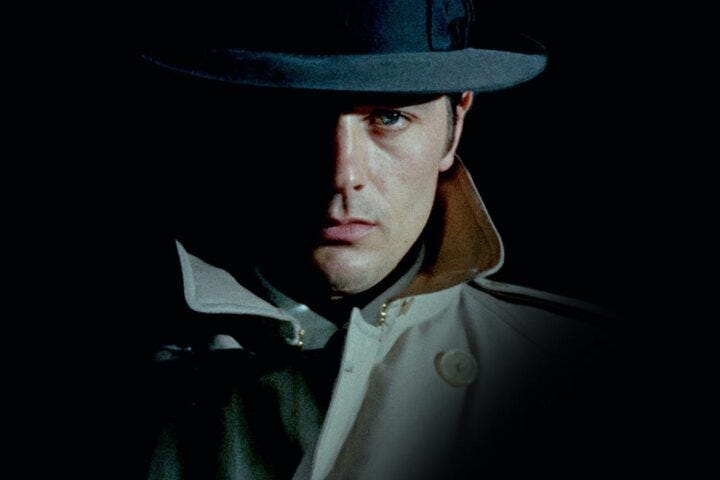


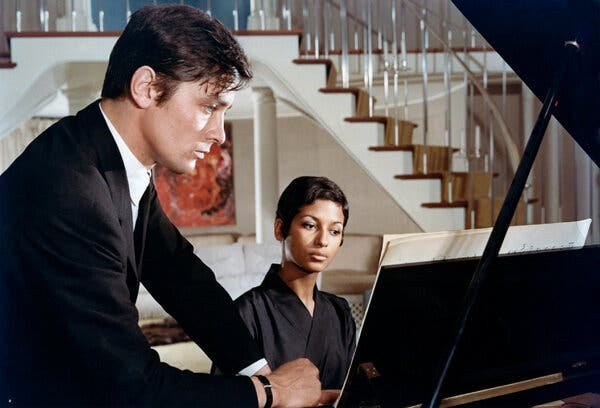
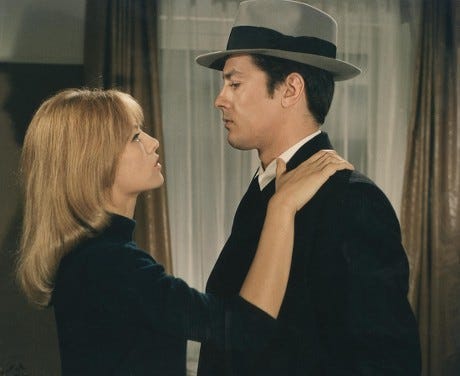
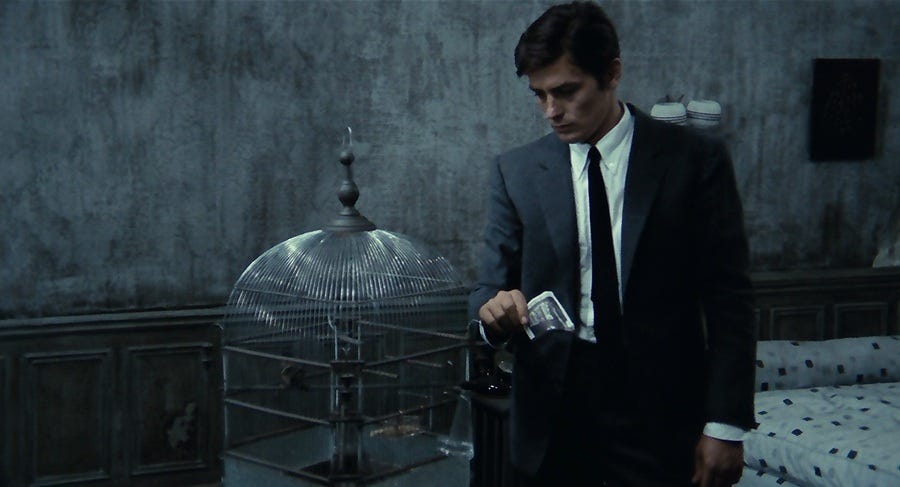

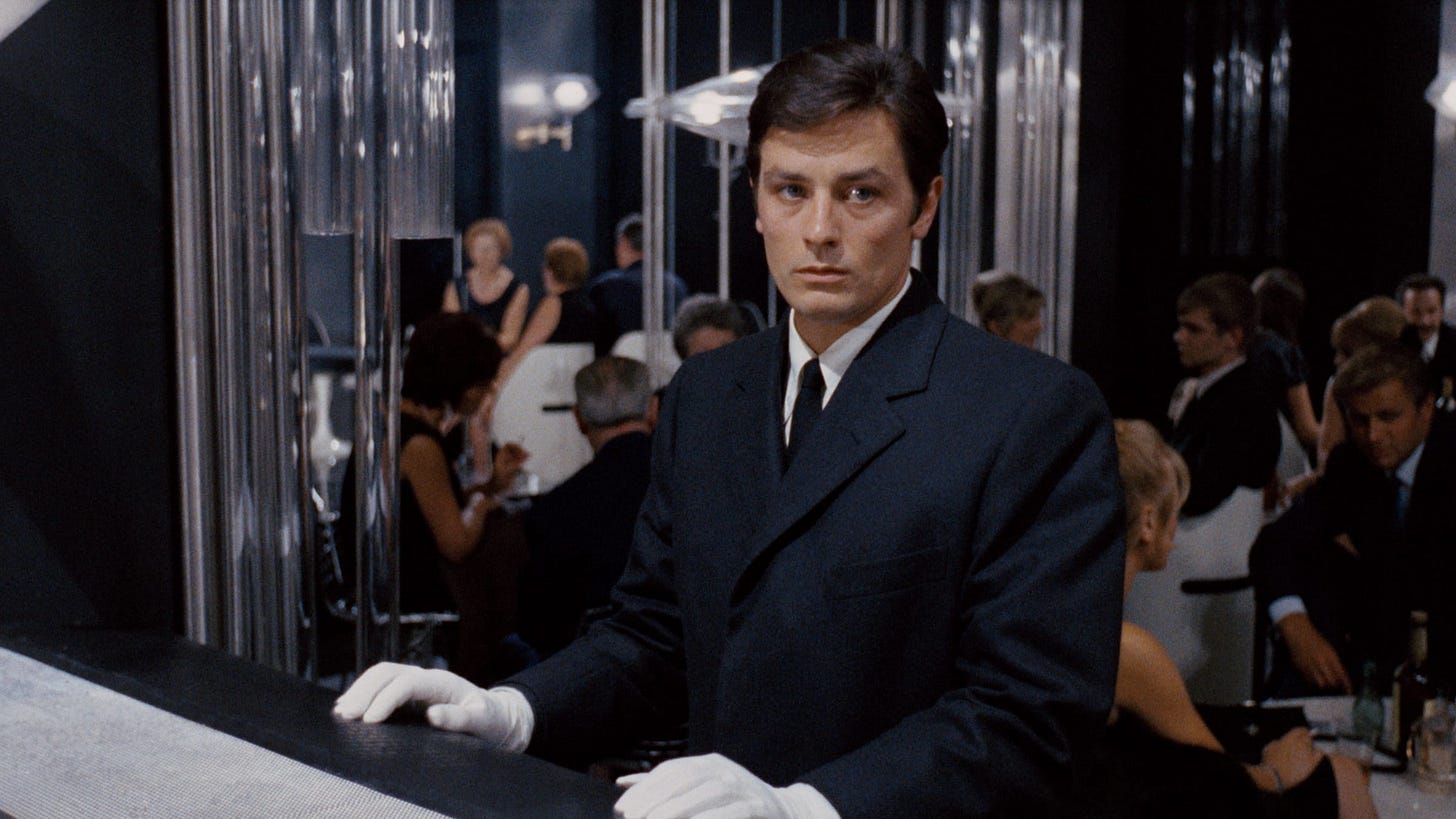


I always thought French movies were confusing and pretentious, but you make me want to give this one a chance.
Interesting perspective. I'll have to check this movie out, for sure. Would you consider suggestions for other films to cover?